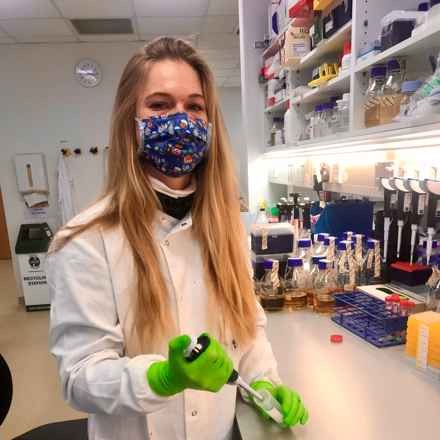Using gene editing to stop progression of Stargardt disease

Prof Robert MacLaren, University of Oxford - £119,610 (co-funded with Retina UK)
New research into a gene editing therapy for those with Stargardt disease is being undertaken at Oxford University. In Stargardt disease, a mutation in the ABCA4 gene means that the ABCA4 protein produced from the gene is faulty and this leads to sight loss. The project aims to develop a gene therapy to ensure healthy ABCA4 protein is made and further damage is prevented.
What is the problem?
Stargardt disease is the most common macular dystrophy affecting young people. Stargardt disease often causes central vision loss, which begins in childhood. Currently there are no treatments for Stargardt disease.
What are they doing?
When proteins are made in the cell, the information stored in the DNA is passed to a similar molecule called RNA (ribonucleic acid) in the cell nucleus. The type of RNA that contains the information for making a protein is called messenger RNA (mRNA) because it carries the information, or message, from the DNA out of the nucleus into the cytoplasm where proteins are made. If there is a fault in the DNA there will also be a fault in the mRNA, which leads to a faulty protein.
Professor MacLaren and his team will be using a gene editing technique called CRISPR to correct the mutation in the mRNA that codes for the ABCA4 protein. By fixing the mutation in the mRNA this means that the ABCA4 protein created will be healthy and functional.
How can this help?
If this study is successful, it could lead to a new treatment for Stargardt disease which halts the progression of the disease, and stops further vision loss. This new technique could also be used for other macular dystrophies such as Best disease or Doyne honeycomb dystrophy.
Want to know more?
To learn more about this research, please see the video below.
See our other projects
Since 1987 the Macular Society has invested around £10 million in over 100 research projects.
Explore more research
Beating macular disease through funding medical research and improving the lives of those living with macular disease.
Get the latest research news from the Macular Society
To hear about life-changing research and treatments, subscribe to our monthly enewsletter today. Together we can Beat Macular Disease.
Sign up to our free email newsletter



